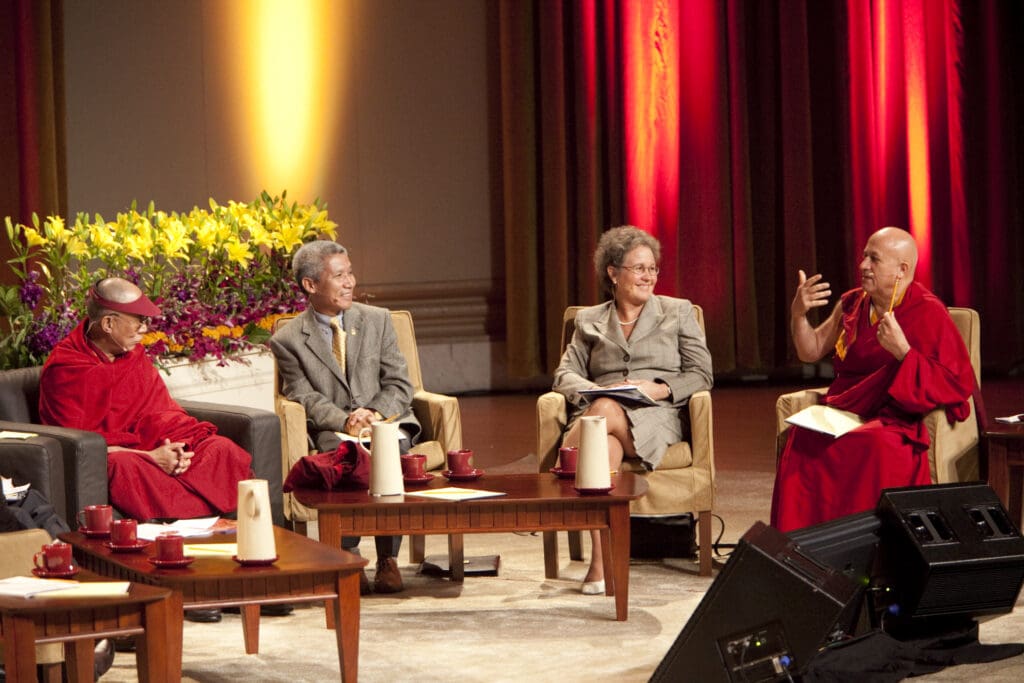
At a time of unprecedented complexity, deepening polarization, and rapid technological transformation, fostering genuine dialogue has never been more critical. One need only consider the ethical implications today of humanity’s vigorous pursuit of artificial intelligence with its vast potential contributions—and risks.
Over 37 years, the Mind & Life Institute has created a model for dialogue where diverse perspectives from contemplative traditions and the humanities are brought together on an equal footing with science. What makes these multidisciplinary dialogues possible is that they are predicated on deep listening. Participants gather with mutual respect, each with a willingness to change their views to allow new insights to emerge. When disagreements arise, there is an underlying respect for divergent viewpoints.
Mind & Life Dialogues explore vital questions at the heart of the human experience. What is the nature of our emotions? What role do altruism and compassion have in economic systems? How can an understanding of our interdependence inform ecological action?
Examples of successful dialogues can be found in the Mind & Life Digital Library featuring conversations between His Holiness the Dalai Lama and leading scientists, scholars, and contemplatives spanning over three decades. This carefully curated archive offers an accessible, easy-to-navigate resource for better understanding the art of dialogue, while tracing the evolution of the field of contemplative science.
As reflected throughout this resource, in its purest form, dialogue is an expression of humility, with participants motivated by the higher goal of serving humanity through expanding horizons of ideas, knowledge, and their application.
Throughout the dialogues, profound insights emerge with deep relevance for our world today. Such was the case at the 2000 Mind & Life Dialogue on Destructive Emotions with its exploration into the root causes of destructive behavior and how we can learn to regulate the emotions that fuel these tendencies. In the clip below, psychologist and author Dan Goleman engages His Holiness and neuroscientist and Mind & Life co-founder Francisco Varela in a lively discussion on the importance of preparing the mind, through mindfulness practice, to identify and transform negative emotions.
One of the benefits of interdisciplinary, cross-cultural dialogue as practiced by Mind & Life is the opportunity to explore how context and culture influence mindsets, and the potential for transformation. At the 1990 Mind & Life Dialogue on Emotions and Health, for example, meditation teacher Sharon Salzberg asked the Dalai Lama about negative mind states such as self-contempt, and what to do when people are unable to see the essential goodness inside themselves. I invite you to watch below as His Holiness engages in conversation with meditation teacher Jon Kabat Zinn and psychologist Daniel Brown about the root causes of negative self-talk, particularly in the West, and the implications of low self-esteem for individuals and society at-large.
While the Dialogues date back 37 years, the themes—from the impact of meditation on the mind to ethical considerations in scientific research—are evergreen. At the 2007 Mind & Life Dialogue on The Universe in a Single Atom, inspired by the Dalai Lama’s book by the same name, leading physicists, philosophers, ethicists, and experts in biotechnology came together to explore the convergence of science and spirituality. In the exchange below, quantum physicist and 2022 Nobel Laureate Anton Zeilinger and the Dalai Lama marvel at the revelation of “non locality” in physics. Participants in the Dialogue go on to explore the interconnected nature of the universe.
Throughout the Dialogues, His Holiness has conveyed a consistent and hopeful set of messages, urging that we use the power of the human mind as an ally rather than a source of suffering. The journey to creating a more peaceful, compassionate world, he reminds us, begins within individual hearts and minds and extends outward.
The warm-hearted exchange between differing perspectives and worldviews made possible through Mind & Life is surely a model for what is needed today given the extraordinary complexity of the challenges we face. Building on Mind & Life’s extraordinary legacy, I look forward to our next chapter knowing that our work to engage diverse perspectives and reveal new insights is more needed than ever.
Thupten Jinpa is Chair of the Mind & Life Institute and has served as the principal English translator to His Holiness the Dalai Lama since 1985.

